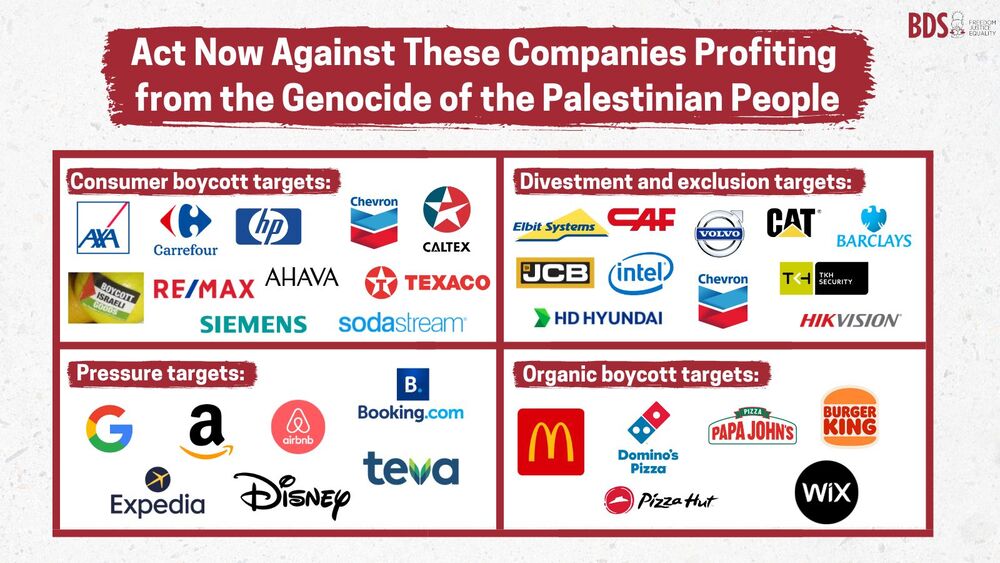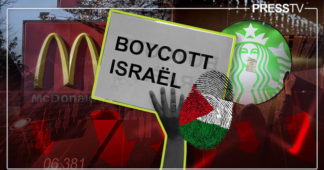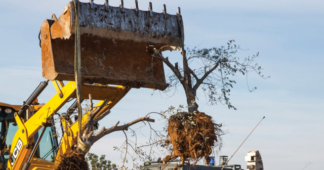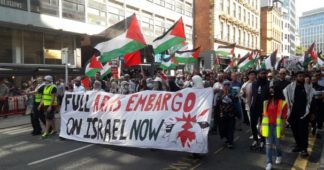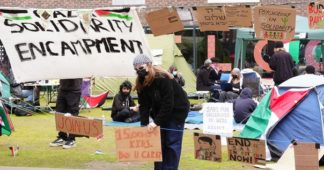Jan 5, 2024
Below is a detailed guide to our targeted consumer boycotts, divestment and pressure campaigns. Help us spread the word to maximize our impact!
The Palestinian BDS National Committee (BNC), the largest coalition in Palestinian society that is leading the global Boycott, Divestment and Sanctions (BDS) movement, salutes activists, organizations and institutions worldwide that have expressed meaningful solidarity with our urgent struggle to stop Israel’s unfolding genocide in Gaza by escalating boycott and divestment campaigns. The spreading boycotts of complicit Israeli and multinational corporations can be effective if done strategically.
Ending all state, corporate and institutional complicity with Israel’s genocidal regime is more urgent than ever. Our lives and livelihoods literally depend on it.
Targeted Boycotts vs. Non-Targeted Boycotts:
People of conscience around the world are rightfully shattered, enraged, and sometimes feeling powerless about Israel’s #GazaGenocide. Many feel compelled to boycott any and all products and services of companies tied in any way to Israel. The proliferation of extensive “boycott lists” on social media is a result of this. The question is how to make boycotts effective and actually have an impact in holding corporations accountable for their complicity in the suffering of Palestinians?
The BDS movement uses the historically successful method of targeted boycotts inspired by the South African anti-apartheid movement, the US Civil Rights movement, the Indian anti-colonial struggle, among others worldwide.
We must strategically focus on a relatively smaller number of carefully selected companies and products for maximum impact. We need to target companies that play a clear and direct role in Israel’s crimes and where there is real potential for winning, as was the case with, among others, G4S, Veolia, Orange, Ben & Jerry’s and Pillsbury. Compelling large, complicit companies, through strategic and context-sensitive boycott and divestment campaigns, to end their complicity in Israeli apartheid and war crimes against Palestinians sends a very powerful message to hundreds of other complicit companies that “your time will come, so get out before it’s too late!”
Many of the prohibitively long lists going viral on social media do the exact opposite of this strategic and impactful approach. They include hundreds of companies, many without credible evidence of their connection to Israel’s regime of oppression against Palestinians. Many do not have clear demands to the companies as to what we expect them to do to end the boycott, making them ineffective.
That being said, all peaceful popular efforts, including boycott and divestment, to hold all genuinely complicit corporations (and institutions) accountable for supporting Israel’s grave violations of Palestinian rights are justified and called for. It is perfectly legitimate, for instance, to boycott companies whose Israeli branch or franchisee has supported Israel’s unfolding genocide in Gaza, some of which we mention below in the grassroots organic boycott targets section.
Also, a company or product may make perfect sense as a boycott target in one context or city but not another. This context-sensitivity is a key operational principle of our movement. Regardless, we all have limited human capacity, so we’d better use it in the most effective way to achieve meaningful, sustainable results that can truly contribute to Palestinian liberation. We therefore call on our supporters to strengthen our targeted campaigns and boycott the complicit companies named on our website to maximize our collective impact.
As an intersectional movement that connects Palestinian liberation with racial, indigenous, social, gender and climate justice struggles, we also recommend boycotting companies that are involved in oppressing other communities as well. We also recommend adopting a universal human rights investment screen, to prevent investments in all companies complicit in human rights violations.
For more information on the selection criteria for new campaigns used by the BDS movement click here. The following are the current top priority boycott targets of the global BDS movement.
We have split these targets into four sections:
1. Consumer boycott targets – The BDS movement calls for a complete boycott of these brands carefully selected due to the company’s proven record of complicity in Israeli apartheid.
2. Divestment and exclusion targets – The BDS movement works to pressure governments, institutions, investment funds, city councils, etc. to exclude from procurement contracts and investments and to divest from, as the case may be, as many complicit companies as practical, especially arms companies and banks. We rely on the following authoritative sources:
-
AFSC list of companies that have provided Israel with weapons and other military equipment used in its #GazaGenocide.
-
AFSC Investigate database of companies enabling the occupation.
-
UN database of businesses involved in Israel’s illegal settlement enterprise.
-
WhoProfits database of Israeli and international corporations profiting from the ongoing Israeli occupation.
-
Don’t Buy Into Occupation list of businesses involved in the illegal Israeli settlement enterprise in the OPT in which European financial institutions have investments.
3. Pressure targets – The BDS movement actively calls for pressure campaigns against these targets. This includes boycotts when reasonable alternatives exist, as well as lobbying, peaceful disruptions, and social media pressure.
4. Organic boycott targets – The BDS movement did not initiate these grassroots boycott campaigns but supports them due to these brands’ complicity in Israel’s genocide and apartheid against Palestinians.
1. Consumer boycott targets:
Hewlett Packard Inc (HP Inc)
HP Inc (US) provides services to the offices of genocide leaders, Israeli PM Netanyahu and Financial Minister Smotrich. HPE, which shares the same brand, provides technology for Israel’s Population and Immigration Authority, a pillar of its apartheid regime.
Chevron (including Caltex and Texaco brands)
US fossil fuel multinational Chevron is the main corporation extracting gas claimed by apartheid Israel in the East Mediterranean. Chevron generates billions in revenues, strengthening Israel’s war chest and apartheid system, exacerbating the climate crisis and Gaza siege, and is complicit in depriving the Palestinian people of their right to sovereignty over their natural resources. Chevron has thousands of retail gas stations around the world under the Chevron, Caltex, and Texaco brand names.
Siemens
Siemens (Germany) is the main contractor for the Euro-Asia Interconnector, an Israel-EU submarine electricity cable that is planned to connect Israel’s illegal settlements in the occupied Palestinian territory to Europe. Siemens-branded electrical appliances are sold globally.
Carrefour
Carrefour (France) is a genocide enabler. Carrefour-Israel has supported Israeli soldiers partaking in the unfolding genocide of Palestinians in Gaza with gifts of personal packages. In 2022, it entered a partnership with the Israeli company Electra Consumer Products and its subsidiary Yenot Bitan, both of which are involved in grave violations against the Palestinian people.
AXA
Insurance giant AXA (France) invests in Israeli banks financing war crimes and the theft of Palestinian land and natural resources. When Russia invaded Ukraine, AXA took targeted measures against it. Yet, Axa has taken no action against Israel, a 75-year-old regime of settler-colonialism and apartheid, despite its ongoing genocidal war on Gaza.
SodaStream
SodaStream is an Israeli company that is actively complicit in Israel’s policy of displacing the indigenous Bedouin-Palestinian citizens of present-day Israel in the Naqab (Negev) and has a long history of racial discrimination against Palestinian workers.
Ahava
Ahava cosmetics is an Israeli company that has its production site, visitor center, and main store in an illegal Israeli settlement in the occupied Palestinian territory.
RE/MAX
RE/MAX (US) markets and sells property in illegal Israeli settlements built on stolen Palestinian land, thus enabling Israel’s colonization of the occupied West Bank.
Israeli produce in your supermarkets
Boycott produce from Israel in your supermarket and demand their removal from shelves. Beyond being part of a trade that fuels Israel’s apartheid economy, Israeli fruits, vegetables, and wines misleadingly labeled as “Product of Israel” often include products of illegal settlements on stolen Palestinian land. Israeli companies do not distinguish between the two, and neither should consumers.
2. Divestment & exclusion targets:
Though the BDS movement calls for divesting from and excluding from procurement/investment all the companies in the four authoritative databases listed above, we are focusing on the following targets:
Elbit Systems
Elbit Systems is apartheid Israel’s largest arms company. It “field-tests” its weapons on Palestinians, including in Israel’s ongoing genocidal war in Gaza. On top of building killer drones, Elbit makes surveillance technology for Israel’s apartheid wall, checkpoints and Gaza fence, enabling apartheid. The US and EU use Elbit’s technology to militarize their borders, violating refugee and indigenous peoples’ rights.
Intel
Intel has announced that it will invest $25 billion in apartheid Israel as Israel’s #GazaGenocide continues, signaling its commitment to bolstering apartheid. The company’s first development center outside the US was opened in Haifa in 1974. For decades, Intel has invested in apartheid Israel. Its plant at “Qiryat Gat” is built on Palestinian land within the boundaries of the Palestinian village of Iraq al Manshiya, which was ethnically cleansed and razed to the ground and then replaced by the Israeli settlement of Qiryat Gat.
HD Hyundai/Volvo/CAT/JCB
Machinery from HD Hyundai (South Korea), Volvo (Sweden/China), CAT (US), and JCB (UK) has been used by Israel in the ethnic cleansing and forced displacement of Palestinians through the destruction of their homes, farms, and businesses, as well as the construction of illegal settlements on land stolen from them, a war crime under international law.
Barclays
Barclays Bank (UK) holds more than £1 billion in shares of, and provides more than £3bn in loans and underwriting to nine companies whose weapons, components and military technology have been used in Israel’s armed violence against Palestinians.
CAF
Basque transport firm CAF builds and services the Jerusalem Light Rail (JLR), a tram line that serves Israel’s illegal settlements in Jerusalem. CAF benefits from Israel’s war crimes on stolen Palestinian land.
Chevron and Chevron-owned Noble Energy
US fossil fuel multinational Chevron is the main international corporation extracting gas claimed by apartheid Israel in the East Mediterranean. Chevron and Chevron-owned Noble Energy generate billions in revenues, strengthening Israel’s war chest and apartheid system as well as exacerbating the climate crisis.
HikVision
Amnesty International has documented high-resolution CCTV cameras made by Hikvision (China) installed in residential areas and mounted to Israeli military infrastructure for surveillance of Palestinians. Some of these models, according to Hikvision’s own marketing, can plug into external facial recognition software.
TKH Security
Amnesty International has identified cameras made by TKH Security (Netherlands) used by Israel for surveillance of Palestinians. TKH provides Israeli police with surveillance technology that is used to entrench apartheid.
3. Pressure targets:
The BDS movement calls for pressure against these companies, including boycotts, if reasonable alternatives exist.
Google and Amazon (US)
In May 2021, as the Israeli military bombed homes, clinics, and schools in Gaza and threatened to push Palestinian families from their homes in occupied Jerusalem, Amazon Web Services and Google Cloud signed a $1.22 billion contract to provide cloud technology to the Israeli government and military. By supporting Israeli apartheid with vital technologies, Amazon and Google are directly implicated in its entire system of oppression, including its unfolding genocide in Gaza. Join the #NoTechForApartheid campaign.
Airbnb/Booking/Expedia
Airbnb (US), Booking.com (Netherlands) and Expedia (US) all offer rentals in illegal Israeli settlements built on stolen Palestinian land.
Disney
The Disney-owned Marvel Studios (US) is promoting in the next Captain America film a “superhero” that personifies apartheid Israel. Both companies are therefore complicit in “anti-Palestinian racism, Israeli propaganda, and the glorification of settler-colonial violence against Indigenous people,” as Palestinian cultural organizations have stated.
Teva Pharmaceutical Industries
Teva is an Israeli pharmaceutical company and the world’s largest generic drug manufacturer. Teva benefits from Israel’s illegal occupation of Palestinian lands allowing the company to exploit the captive Palestinian market.
4. Grassroots organic boycott targets:
McDonald’s (US), Burger King (US), Papa John’s (US), Pizza Hut (US), WIX (Israel), etc. are now being targeted in some countries by grassroots organic boycott campaigns, not initiated by the BDS movement. BDS supports these boycott campaigns because these companies, or their branches or franchisees in Israel, have openly supported apartheid Israel and/or provided generous in-kind donations to the Israeli military amid the current genocide. If these grassroots campaigns are not already organically active in your area, we suggest focusing your energies on our strategic campaigns above.
Recently, McDonald’s franchisee in Malaysia has filed a SLAPP lawsuit against solidarity activists, claiming defamation. Instead of holding the Israel franchisee to account for supporting genocide, we are now witnessing corporate bullying against activists. For both these reasons, we are calling to escalate the boycott of McDonald’s until the parent company takes action and ends the complicity of the brand.
Remember, all Israeli banks and virtually all Israeli companies are complicit to some degree in Israel’s system of occupation and apartheid, and hundreds of international corporations and banks are also deeply complicit. We focus our boycotts on a small number of companies and products for maximum impact.
We remind our readers that publication of articles on our site does not mean that we agree with what is written. Our policy is to publish anything which we consider of interest, so as to assist our readers in forming their opinions. Sometimes we even publish articles with which we totally disagree, since we believe it is important for our readers to be informed on as wide a spectrum of views as possible.
